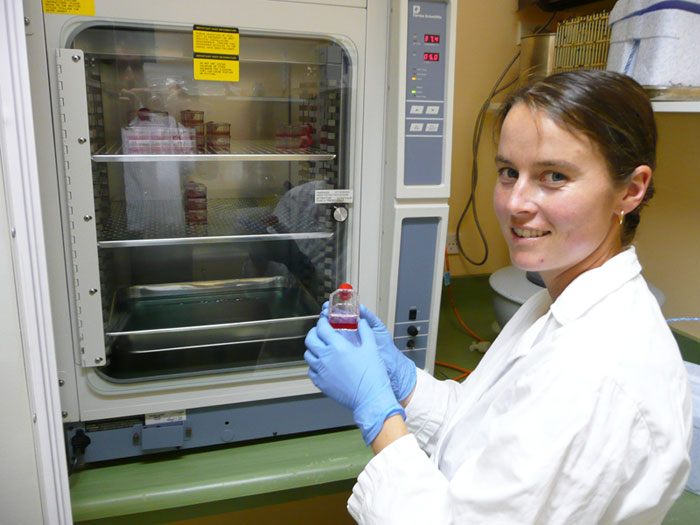The Australian poultry industry’s capacity for managing some of its most important endemic diseases has received a boost thanks to the enterprising work of a young Poultry CRC scientist at the University of New England (UNE).
Dr Katrin Renz, a Research Fellow with UNE’s School of Environmental and Rural Science, wants to improve methodologies for isolation and propagation of avian viral pathogens, such as Marek’s disease (MD), in cell culture.
Having noticed significant differences in the methodologies used at the Institute for Animal Health during a visit to the UK last year, Dr Renz modified her own methods accordingly and has managed to grow viruses, including Australian strains of Marek’s disease virus (MDV), to consistently high titre necessary for pathogen isolation and further research.
According to Dr Renz, up until now most field isolates could not be grown on cell culture at all, which meant that it was impossible to isolate them as cell cultured infective material and use them in animal experiments to characterise the virus and determine whether the new virus is more virulent than previous ones.
“There is evidence that in the face of blanket vaccination, especially in the USA, MDV strains tend to overcome vaccination, driving the virus to become more and more virulent,” she said. “There will be a stage where no vaccination will help protect the animals from developing clinical MD. Fortunately, the situation in Australia is quite different, as the good old HVT vaccine still offers good protection, but breeders and layers already get the ‘golden shot’ Rispens vaccine, as it is the superior vaccine. If there is no ongoing evaluation of the MD situation in the field, with virus isolation and testing, it is possible that the poultry industry will face another wave of MD outbreaks in a couple of years’ time. Currently the situation is under control, but that does not mean that this will stay so forever, especially not if new poultry lines are imported from overseas.”
Dr Renz is hoping this work will help the Australian poultry industry to safeguard production and enable it to react quickly, possibly by changing the vaccination strategy, in the event of vaccine breaks due to new viruses of increased virulence.
“Having a laboratory where viruses such as MDV can be grown is essential for the Australian poultry industries,” said Poultry CRC CEO, Professor Mingan Choct. “The UNE laboratory where Dr Renz is working holds great promise towards fulfilling this role.”
Although cell culture work can be tedious and time-consuming and there is a high chance of failure at any time during due to contamination, sudden cell death, etc., Dr Renz is determined to succeed.
“It’s something I really like as it is an ongoing challenge to get the work done properly and successfully,” she said. “You have to concentrate right from the start; one wrong touch without disinfecting your hands or gloves could be detrimental. Working with primary cell lines also means that I need to constantly replace my clean cell stocks, which I get from 9-11 day-old embryos, so I have to incubate fertile eggs to this stage and then process the embryos for cell culture.”


